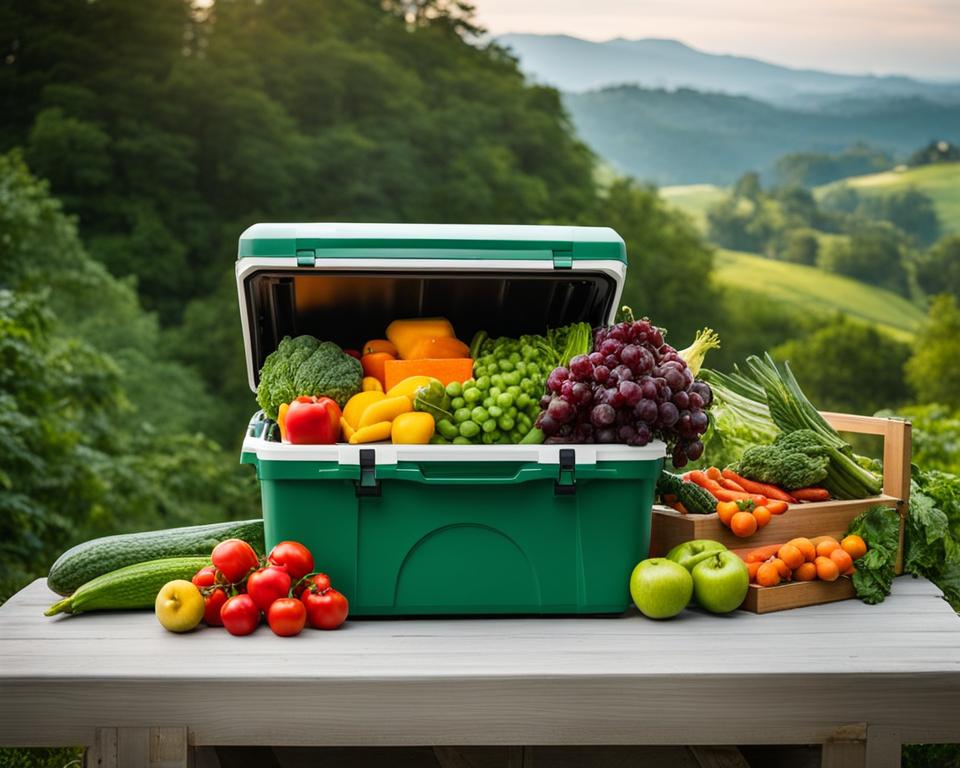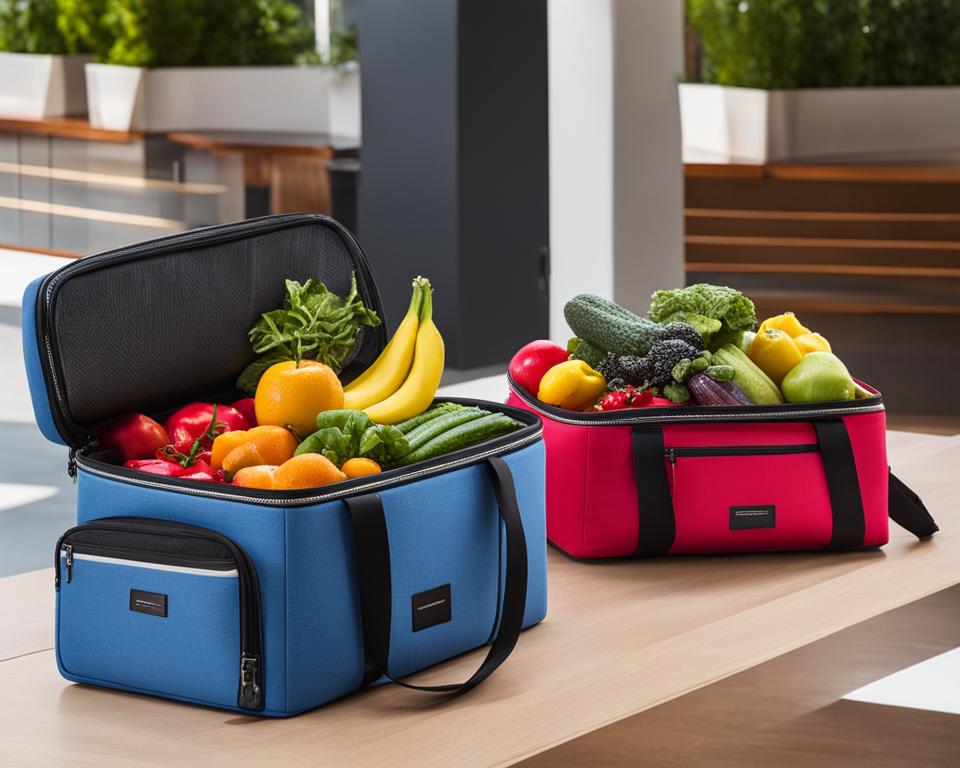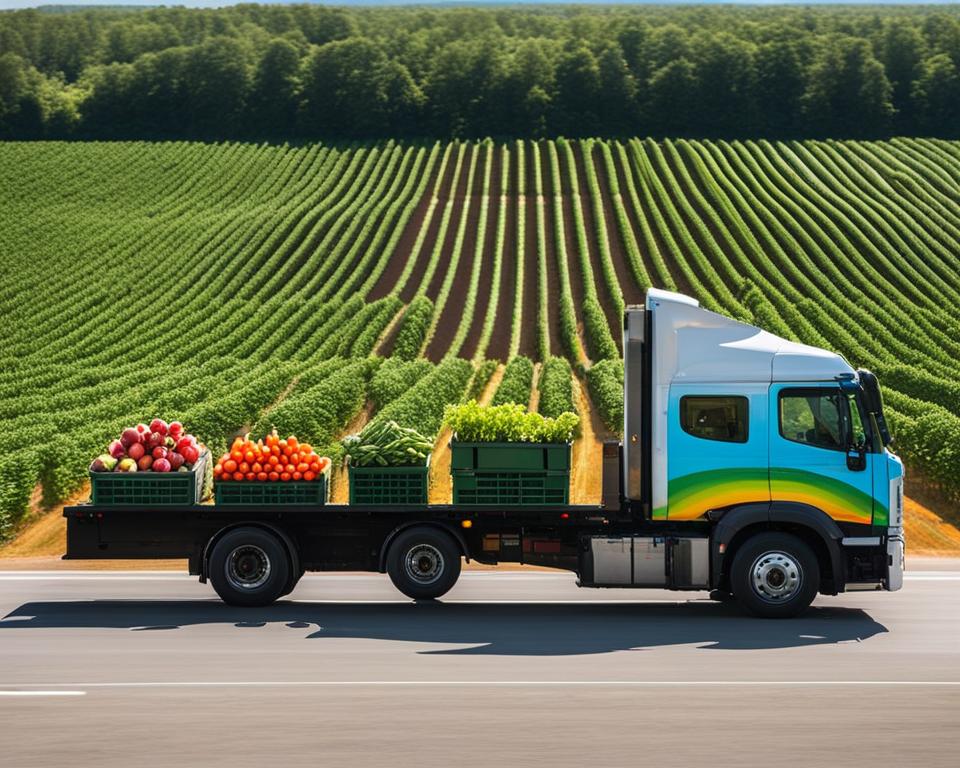Homegrown Produce Transportation of fruits and vegetables can be a challenging task. The produce must be transported with care to ensure it reaches its optimal destination. Fresh produce transport, fruit and vegetable transportation, and refrigerated produce logistics are all essential elements of the transportation process.
Using coolers and specialized produce carriers can help maintain the quality and taste of homegrown produce during transportation. In addition, refrigerated logistics plays a crucial role in shipping perishable goods and maintaining a cold chain throughout transportation.
A truck driving through a rural landscape on a hot summer day. The back of the truck is open to reveal rows of crates filled with fresh, colorful produce. The crates are surrounded by state-of-the-art cooling units, designed to keep the produce at the perfect temperature during transportation. The sky above is clear and blue, with small puffy clouds dotting the horizon. In the distance, a farm can be seen, with fields of crops stretching out as far as the eye can see.
Key Takeaways:
- The transportation of homegrown produce requires innovative cooling solutions to ensure freshness from garden to table.
- The use of coolers, specialized produce carriers, and refrigerated logistics is crucial in maintaining the quality and taste of fruits and vegetables during transportation.
- Fresh produce transport, fruit and vegetable transportation, and refrigerated produce logistics are all essential elements of the transportation process.
- Refrigerated logistics plays a crucial role in shipping perishable goods and maintaining a cold chain throughout the transportation process.
- Using specialized produce carriers can help maintain optimal temperature and humidity levels for different types of produce.
The Role of Coolers in Produce Transportation
Transporting homegrown produce requires efficient cooling solutions that maintain optimal storage conditions for fresher, tastier fruits and vegetables. Coolers are an essential part of the supply chain for transporting perishable goods, which is why it is essential to understand the different types available: hard coolers, soft coolers, and specialized produce carriers.
Hard Coolers
Hard coolers are also called ice chests and can keep produce fresh for longer periods due to their superior insulation. These coolers are usually made from durable materials such as metal and hard plastic, which can withstand rugged produce transportation conditions. They are ideal for longer trips and can maintain the temperature for up to 10 days, depending on the model and quality.
 Pin
PinThe cooler’s sturdy exterior keeps the produce protected and chilled, ensuring that it arrives at its destination in perfect condition.
Soft Coolers
Soft coolers are lightweight, flexible and easy to carry, which makes them perfect for short trips or overnight produce transportation. They are made from soft and durable materials that provide excellent insulation to prevent thermal fluctuations. Depending on the model and brand, soft coolers can maintain the temperature for up to 2-3 days.
 Pin
PinSpecialized Produce Carriers
Specialized produce carriers are designed specifically for transporting fresh fruits and vegetables. These carriers can maintain the optimal temperature and humidity levels for different types of produce, ensuring superior freshness and taste. They are equipped with adjustable dividers to separate different types of produce, which minimizes bruising and damage during transportation.
Using the right cooler is critical in maintaining a consistent supply of high-quality produce for consumers. In the next section, we will discuss how refrigerated logistics plays a critical role in preserving the freshness of homegrown produce during transportation.
Refrigerated Logistics for Farm-to-Table Produce Transportation
Shipping perishable goods requires specialized logistics that guarantee the quality and freshness of the produce. The farm-to-table shipping process necessitates maintaining a controlled environment to ensure food safety and extend shelf life. Without proper temperature and humidity control throughout the supply chain, the quality and taste of fruits and vegetables can rapidly deteriorate. This is where refrigerated produce logistics and cold chain transportation play an important role.
Perishable goods shipping involves coordinating the logistics of moving fresh produce from farms to retailers and restaurants. The supply chain must avoid exposure to temperature fluctuations, and a single glitch in the transportation process can affect the entire delivery. Therefore, it’s vital to having a temperature-controlled supply chain that maintains consistency from start to finish.
Farm-to-Table Shipping and Food Supply Chain Logistics
 Pin
PinFarm-to-table shipping refers to the logistics of produce transportation directly from the farms to the final destination. Shipments must be monitored, tracked, and insured as the goods travel across the country. The process also involves customs regulations, compliance with safety standards, and strict refrigeration protocols to ensure that the food maintains the correct temperature throughout its journey.
Logistics companies use advanced technologies and GPS tracking systems that allow the company and consumers to monitor the location and temperature of the produce during transportation. The trucks and shipping containers used in this process are temperature-controlled and equipped with sensors that monitor environmental factors like temperature, humidity, and carbon dioxide.
Cold Chain Transportation
Cold chain transportation refers to the process of transporting and storing perishable goods in a temperature-controlled environment throughout the supply chain. It is an essential component of refrigerated produce logistics and is used to maintain the right temperature for the produce to remain fresh and maintain quality.
Temperature-sensitive fruits and vegetables require special handling throughout transportation, and cold chain logistics ensure that the environment is controlled to avoid spoilage, damage, and waste. From refrigerated trucks to cold storage facilities, the handling of produce must remain within the optimal temperature range to prevent any damage to the product.
Conclusion
In conclusion, the Homegrown Produce Transportation requires innovative cooling solutions to ensure freshness and quality. As discussed, the use of coolers, specialized produce carriers, and refrigerated logistics is essential for maintaining the taste and texture of fruits and vegetables from the garden to the table.
By implementing these innovative solutions, producers can ensure that their homegrown produce arrives at its destination in optimal condition. This guarantees that consumers can enjoy high-quality, fresh produce, creating a positive farm-to-table experience.
In the competitive world of fresh produce transport, it is crucial to prioritize the quality and freshness of products. With the help of innovative cooling solutions and logistics, producers can meet and exceed consumer expectations.
In summary, the use of coolers, specialized produce carriers, and refrigerated logistics is not just about transportation, but about preserving the taste and quality of homegrown produce. By doing so, we can promote sustainability and healthy food choices while supporting local growers and producers.
FAQ
How do coolers help in the transportation of fruits and vegetables?
Coolers play a vital role in maintaining the freshness and quality of homegrown produce during transportation. They are designed to keep fruits and vegetables at the optimal temperature, preventing spoilage and preserving their taste. Coolers can be either hard coolers, which offer sturdy insulation and durability, or soft coolers, which are lightweight and easy to carry. Specialized produce carriers are also available, ensuring that each type of produce is transported in the right conditions to maximize freshness.
What is the significance of refrigerated logistics in farm-to-table produce transportation?
Refrigerated logistics is crucial for shipping perishable goods, especially when it comes to farm-to-table produce transportation. It involves maintaining a cold chain throughout the entire supply chain to preserve the quality and taste of the produce. Perishable goods shipping requires careful monitoring of temperature and humidity levels, along with proper handling and storage, to prevent spoilage and ensure the freshness of the fruits and vegetables. Cold chain transportation is essential in preserving the nutritional value and appearance of produce while delivering it to consumers in optimal condition.
What are some challenges in the transportation of perishable goods?
The transportation of perishable goods, such as fruits and vegetables, presents several challenges. One major challenge is maintaining the ideal temperature and humidity levels to prevent spoilage and ensure freshness. This requires specialized equipment, such as coolers and refrigerated containers, as well as real-time monitoring and control systems. Another challenge is managing the logistics of farm-to-table shipping, which involves coordinating various stages of the food supply chain, including harvesting, packaging, transportation, and distribution. Efficient cold chain transportation and proper food supply chain logistics are essential to overcome these challenges and deliver fresh, high-quality produce to consumers.
How can producers ensure the quality of their homegrown produce during transportation?
Producers can ensure the quality of their homegrown produce by implementing innovative cooling solutions and following best practices in transportation. Using coolers, such as hard coolers or soft coolers, to store and transport fruits and vegetables can help maintain the optimal temperature and prevent spoilage. Specialized produce carriers designed to cater to different types of produce can also be utilized. Additionally, relying on refrigerated logistics and cold chain transportation can ensure that the produce remains fresh and of high quality throughout the transportation process. Implementing proper handling and storage techniques, along with regular monitoring and control of temperature and humidity levels, are key to preserving the taste and freshness of homegrown produce.
How do technologies aid in the transportation of homegrown produce?
Technologies play a significant role in the transportation of homegrown produce by enabling real-time monitoring and control of temperature, humidity, and other environmental conditions. IoT (Internet of Things) devices and sensors can be used to track the temperature inside coolers and refrigerated containers, ensuring that the produce is kept at the desired level. These technologies provide producers and logistics providers with valuable data and alerts, allowing them to take immediate action in case of any deviations in the optimal conditions. By leveraging technology, producers can have greater visibility and control over the transportation of their homegrown produce, resulting in improved quality and customer satisfaction.
